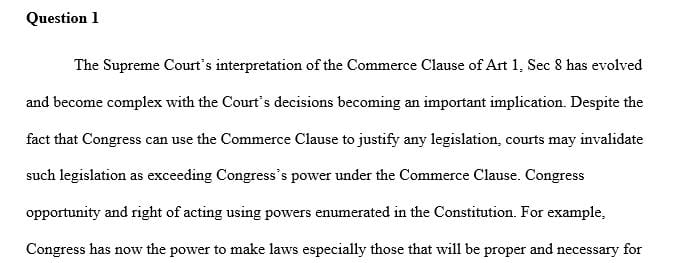How have recent decisions of the Supreme Court interpreting the Commerce Clause of Art.
The questions come from Chapter 3 and 4 of textbook Scheb, John,
Criminal Law and Procedure, 8th edition, ISBN 9781285070117, Cengage
Publisher, if that helps.
How have recent decisions of the Supreme Court interpreting the Commerce Clause of Art. I, Sec. 8 affected congressional authority to define criminal conduct?
What type of political speech, if any, may be prohibited under Brandenburg v. Ohio?Provide an example of such speech.
Why does Justice Douglas, dissenting in Miller v. California, state that “obscenity cases have no business being in the courts”?
The Second Amendment to the U.S. Constitution stipulates: “A well regulated Militia, being necessary to the security of a free State, the right of the people to keep and bear Arms, shall not be infringed.” Explain the reasoning of the Supreme Court in DC v. Heller (2008), in striking down a District of Columbia ordinance that effectively created a complete ban on handguns within the District.
On what constitutional grounds would a person likely challenge a local ordinance that provided “no one shall appear on the public streets unless he or she is clothed in ordinary street attire”?
What effect did the right of privacy announced in Griswold v. Connecticut (1965) have on the Supreme Court’s reasoning in its subsequent decision in Roe v. Wade(1973) invalidating state laws prohibiting abortions?
Why is the due process clause of the 14th Amendment important with regard to substantive criminal law?
Under what circumstances can criminal statutes be challenged as violations of the Equal Protection Clause of the 14th Amendment?
What test would a court apply in reviewing a statute that made it a crime for a person to practice medicine without a license?Why would it apply this particular test?
Under what circumstances might a person’s failure to act constitute a criminal act?
Distinguish between the concepts of motive and intent in the criminal law.
What is the difference between general and specific intent?
Answer preview to how have recent decisions of the Supreme Court interpreting the Commerce Clause of Art.
MLA
858 Words



